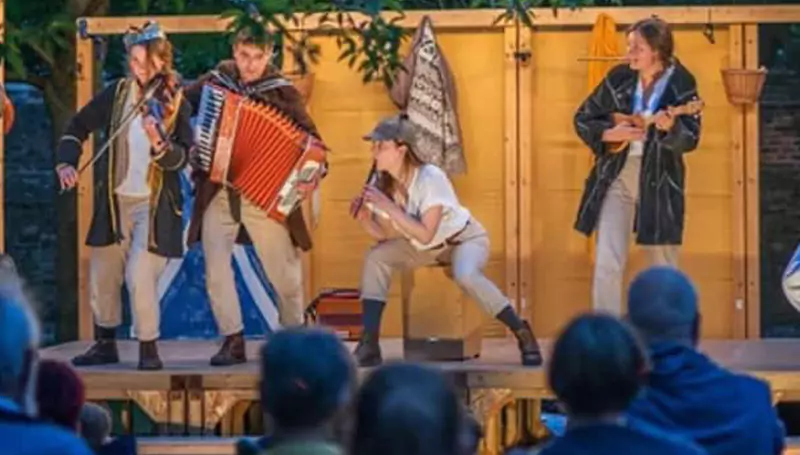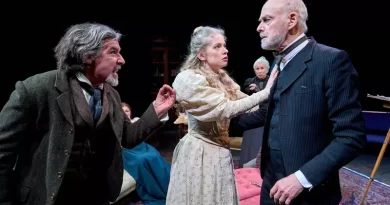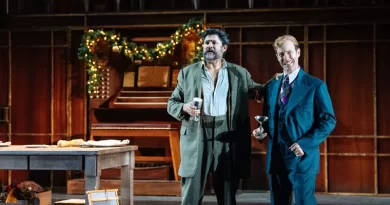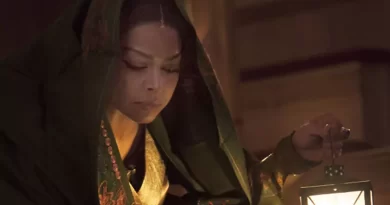“The Comedy of Errors”, Three Inch Fools at Brighton Open Air Theatre (BOAT)
11 September 2024
Simon Jenner in East Sussex
With the revival of Sean Holmes’s Globe 2023 production of The Comedy of Errors with its breakneck speed and lucidity, it’s refreshing to see what a wholly different breakneck might be. A breakneck with just four actors and stage manager. Three Inch Fool Productions directed by Sean Turner come to Brighton for the penultimate week of their long tour. There are full details on their site.
Appropriately, given that fraternity is the play’s theme, two brothers (they even beard alike), producer James Hyde and musical director Stephen Hyde founded Three Inch Fools nine years ago. Music is a major feature and a CD is being released. It has to be said at once that this is the highlight of a furiously-paced production. The reason: a foolish bet to complete in 90 minutes or lose everything (microcosm of the play’s bargain) but with an interval of 15 minutes. No injury time. So the production takes two hours.
The quartet shine as a madrigal-ish ensemble. Individual lyrics are carved out of the play (unlike many other productions), and a song “Sad… Antipholus… fallen from the man he was…” is the musical highlight. There are more, one picking up the “Dives and Lazarus” folk-tune that Vaughan Williams made famous variants of; and with an additional gallimaufry of Scottish and Irish-inflected songs and jigs. The ensemble crackles with instruments and voices, from penny-whistle to violin to banjo and guitar.
The Globe at 108 minutes straight through manages panache with clarity, a razor-edge Ephesus and focus on monetary exchange with each brother given a separate identity. How the company here negotiate this text is to do what Shakespeare did to Plautus: out-do his madcap with a performative brio. Often, here that brio is designed to spin precariously on its top. It’s Shakespeare repeated as farce in the play that invokes it.
James Aldred, Lucy Chamberlain, Charlotte Horner and Peter Long are attended by Stage Manager Emily Niblo, adding to the performance by rushing about and reminding everyone of time flying.
Audience members are recruited to tell the time, and latterly, stand in for the denouement, jacketed with a costume item, when everyone needs to be on stage with bodies wanting. These are mesmerising actors, who deserve the best direction they can respond to.
A summer’s day or an indoor performance might suit this ensemble best. Very few companies pierce the ears of a BOAT audience with enough clarity. Three Inch are as good as most vocally, but have little time to project and the one element this production lacks is a moment of stillness. It takes a few seconds. Their pace though is so skeltering, the pressure to get out the words so dominant, that sense and communication can be lost. That is the worst that can be said, though in Errors it’s (beyond an error) vital.
Nine minutes is taken to introduce themes and the bet. Whilst joyous and full of devising, it’s too long in this rain and needs shortening.
Unhappy captured merchant Egeus of Syracuse (Chamberlain) croaks off with Aldred as the Duke, Chamberlain taking some time here, indeed a full five minutes (as she’s admonished). Naturally Chamberlain’s delivery is at the right pace, withered with an old man’s vocal revenue. And the true vocal scramble begins with Long as one Antipholus, Horner sometimes the other.
Just occasionally I wondered if it was myself, or had I missed that Dromio of Syracuse and his gold had been omitted, before Dromio of Ephesus is charged by the wrong brother for not stowing it?
Bar a few moments, it would be impossible to pick out a consistent actor-to-character, but Chamberlain enjoys a Mrs Traipse-like moment as the singing Courtesan, and Horner as Adriana, wife of the Ephesus Antipholus (I might pay to hear them sing that) delivers her tale of errant then mad husband twice at breakneck speed, rightly garnering cheers. The pace is forgivable, since we’ve seen it performed, though as some moments already lack clarity it could have helped.
In the original, themes of transaction and exchange are underscored; as well as the mistaken exchange of the two sets of identical twin brothers. Identical twins, both called Antipholus are separated from both parents: their mother near their birth by shipwreck. And Antipholus of Ephesus, where the play is set has never met his father. Antipholus of Syracuse left their father seven years ago to seek his brother. They are matched with twin servants: Dromio of Syracuse and Dromio of Ephesus.
Shakespeare’s shortest play at 14,000 lines, is where he also overreaches brilliantly, bidding to outdo the original Plautus in fiendish mis-takings by conflating two of his plots. Just as the Fools bid to outdo Shakespeare’s. Forget improbabilities underscored by identical costumes (reproduced here in burgundy and Brunswick green). It’s a virtuosic game of timing and performative expectation. It’s as much as how the characters take being mistaken, as the mistaking in the first place.
Thus Antipholus of Syracuse can’t believe his luck as gold chains and bags of gold as well as an amorous wife are offered him. Everyone mistakes the twins for the twin, even the twins confuse each other. All is only resolved when everyone collides, one set let out by the Abbess who turns out to be the mother of two and wife to Egeus.
The Fools score by paying off the crowd, using the full space and the real-life brothers have produced a palisade-like set as frontage to the concrete one that BOAT possesses. Two platforms islanded downstage allow antiphonal badinage and clarity too. Long’s long scamper (as a Dromio) round the perimeter dodging in and out of the crowd so he genuinely arrives breathless, is an engaging example of the company’s theatricality. The crowd are taken into the grassy ‘O’, and at the end, rather like a few members, given a group hug in a final song and a detailed roll-call: essential as programmes had run out at this point.
This is an exuberant talented company, picking up practised badinage and running with new ad-libs as they gauge audience and weather. A troupe’s reach should exceed its grasp, or what’s a production for? I’ve rarely seen actors exalt this level of madcap together for so long, and they are endearing as well as daring.
Just occasionally, the actors – though avowedly near the ground or groundlings – do fall flat on their faces for a millisecond. Not as performers but in delivering the truth and clarity of the text with moments of incoherence: not for them, but their audience.
This production is meant to dare Shakespeare back: and it does. Even so, the Fools could afford more time to unravel what must be a confusing plot to all but a few (very) seasoned audience members. One leaves admiring this troupe, indeed falling for them headlong: but just occasionally with a rain-dimmed sense of what this Shakespeare is for.
With brief caveats aside, this ensemble could provide an ideal way into Shakespeare for many of all ages. Though Errors might not be the play!









